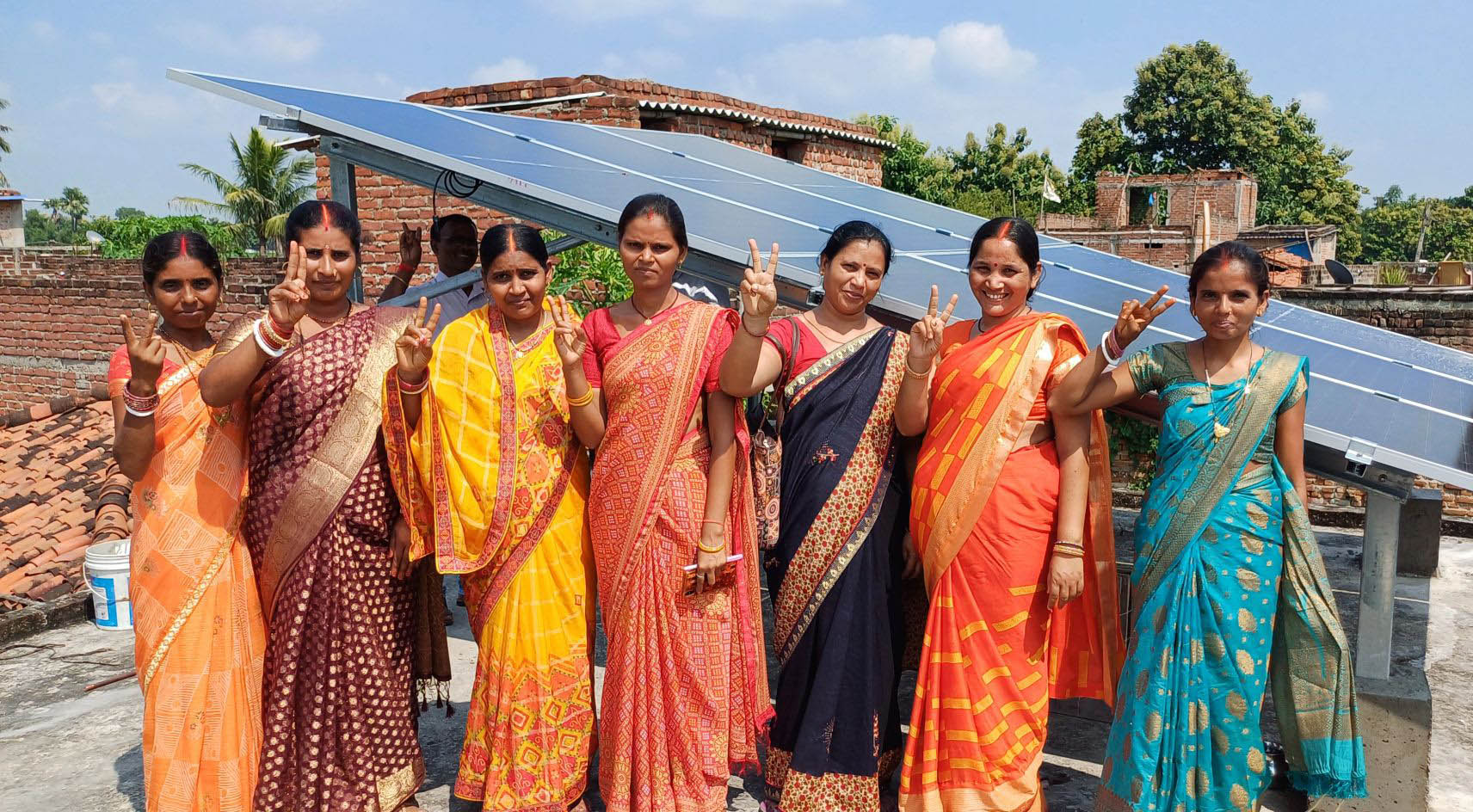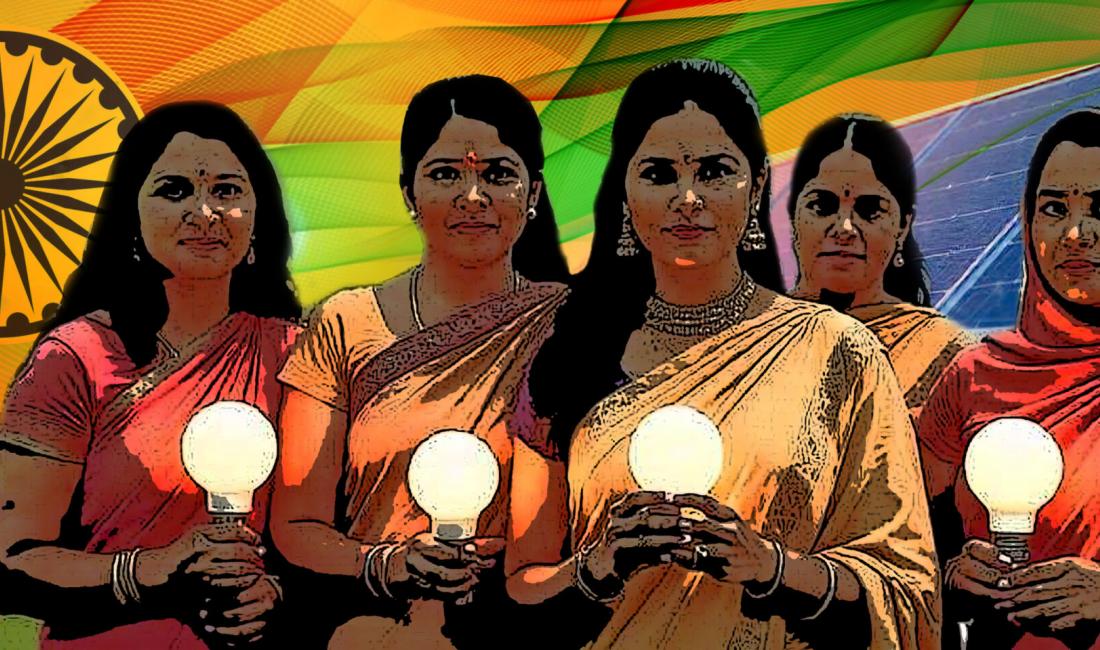Women light up villages and irrigate fields with solar gadgets they make and sell.
This piece and the illustration were first published and produced by Asia Democracy Chronicles.
It is a crisp but sunny morning in Manpur, Gaya, in the eastern Indian state of Bihar, and Anju Devi has already been up and about for hours. But while many young wives like her in Manpur will be spending the day at home, Devi is headed for the Ankush S-Mart Solar Shop, a business fondly named after her son.
The shop, which Devi owns and runs, stocks a variety of solar products, including bulbs, tube lights, lanterns, and torches. To cater to the diverse needs of her local customers, Devi has expanded her inventory to include LED bulbs, fans, and other electrical equipment.
Established in 2019 with an initial investment of INR 20,000 (approximately US$234), this modest solar shop has made Devi’s life more than just a little bit better. It has not only offered a break from her mundane domestic routine, but also made her a financial pillar of her family.
“My shop has given me the gift of economic independence,” says the 30-year-old proud mother of two. “I no longer have to rely on anyone for anything. I sell, repair, and maintain solar products, and people in my village have started calling me ‘Solar Didi (sister)’ with affection.”
In fact, Devi is part of a growing community of climate-smart women entrepreneurs in Bihar who have transitioned from full-time homemakers to empowered business owners. Their journey reflects a broader movement in India toward sustainable energy. At the same time, it highlights how women are helping a country where they are often marginalized reach its clean energy goals.
India has set an ambitious target of achieving 500 gigawatts (GW) of renewable energy capacity by 2030 as part of its commitment to transitioning toward clean energy and combating climate change. This goal aims to reduce the country’s dependence on fossil fuels and cut carbon emissions.
India is among the world’s top five carbon-emitting countries. According to the Global Carbon Project’s 2024 Global Carbon Budget report, India’s share in global carbon emissions is currently 8%. The report says the country’s CO2 emissions probably increased by 4.6% in 2024, with natural gas, coal, oil, and cement among India’s major sources for such emissions.
The UK-based, climate-focused website Carbon Brief meanwhile notes, “While renewable energy is expanding quickly in India, it remains far slower than the rate of power demand growth as the economy rapidly expands.”
Nevertheless, the country has made considerable progress in its effort to shift more toward renewable energy In 2023, India generated 113 billion units (BU) of solar power, surpassing Japan’s 110 BU and establishing itself as the third-largest producer of solar power in the world.
Micro-development schemes
To ensure sustainable energy access for all, especially in rural and underserved areas, India has launched several government schemes meant specifically to help meet this goal. But in some areas, local government programs meant to address other issues have found themselves involved in renewable-energy activities as well.
Anju Devi, for instance, wound up as a solar-lamp technician and solar-shop owner by way of JEEViKA, a World Bank-supported poverty alleviation program that has been operational in Bihar since 2007.
JEEViKA, which is Hindi for “way of life,” is how locals call the Bihar Rural Livelihoods Project run by the Bihar Rural Livelihoods Promotion Society (BRLPS). The BRLPS is an autonomous society under Bihar’s Rural Development Department.
JEEviKA aims to empower women and make them self-reliant through skills training, loans, and other measures. At present, it has a network of over 10 million women, among them Devi, across Bihar. Devi herself recounts that she took advantage of being a JEEViKA member to gain entry into a government solar-lamp project, which she saw as a way for her to contribute to the family coffers.
The SoULs (Solar Urja through Localization for Sustainability) Project was an initiative of the Indian Institute of Technology Bombay (IIT Bombay) and the federal Ministry of New and Renewable Energy. It aimed to provide solar study lamps to every child in rural India, and ran for a limited time in five states, among them Bihar.
Under the project, Devi was selected as a distributor of solar lamps, which enabled her to earn some INR 4,800 (US$56.21) a month. Later, she trained as a technician and learned how to assemble electric components in solar lamps. According to Devi, her solar shop now earns her INR 7,000 (US$81.80) a month. She tells Asia Democracy Chronicles (ADC): “In our tradition, the sun is considered one of the gods, and its blessings seem to have come to me.”
She also has her own hard work and JEEViKA to thank for her success.
“Anju (Devi)’s solar entrepreneurship began with JWiRES (JEEViKA Women Initiative for Renewable Energy and Solutions Pvt Ltd), a company formed by women that trains women in solar energy technologies, product assembly, repair, and maintenance,” says Sabita Kumari, a member of the JWiRES Board of Directors. “This training equips them with the skills necessary to operate their own solar shops.”
There are 400 women solar entrepreneurs in Bihar who have been supported by JWiRES, Kumari says.
“While it has started small, JEEViKA’s impact on India’s renewable energy goals is evident on the ground,” says Mani Bhushan Jha, Program Manager for the Climate, Economics, and Finance Program at World Resources Institute India. “I’ve witnessed how hundreds of solar shops have become energy hubs in villages where grid power is unreliable. The didis involved take pride in reaching over 400 households. It’s these grassroots initiatives that collectively contribute to India’s ambitious 500 GW renewable energy target.”
But there has been a surprise extra benefit. Gaurav Pandey of the Business Development and Enterprise Promotion section at JWiRES believes that women in villages like those in Gaya are quietly challenging traditional gender roles in the energy sector. He remarks, “Involving women in technical and leadership roles within the renewable energy sector is shifting societal perceptions and promoting gender equality in the industry.”
Women power up
For sure, traditional customs and practices still pose challenges for the women entrepreneurs, some of whom are probably taken to task by family and friends who think they are failing to keep up with the household chores because of their activities outside of the home, or just because they are perceived to be “neglecting” the family.
Pandey, though, says that the shift in mindset has been gradual, and that husbands and other family members have started supporting the solar didis.
For instance, Devi’s husband, a small-scale farmer, is now among her supporters in her business. Aanu Kumari, another Bihar local who runs a solar shop, tells ADC, “My husband also helps with the enterprise and encourages me to continually improve and expand the shop.”
“The mindset changed gradually when women began contributing to household expenses, providing support to the male members,” Pandey says.
It also helps that the solar didis are having an impact even outside of their families. In northern Bihar, JEEViKA’s solar-pump initiative has significantly boosted agricultural productivity there while challenging traditional gender norms. In villages facing water scarcity, women have installed solar pumps, providing affordable clean energy for irrigation.
Some small-scale women farmers in northern Bihar have become entrepreneurs, selling irrigation water using these solar pumps. Across the state, there are even solar didis who are now company directors at JWiRES.
According to Pandey, these women are helping in local economic growth.
“Solar shops not only create jobs for women but also stimulate local economies,” he says. “Women reinvest their earnings in education, healthcare, and local infrastructure, contributing to a broader community development that supports sustainable energy adoption.”
WRI’s Jha adds, “Women are catalysts in rural energy access, evolving from selling solar products to trusted advisors. Their technical skills and deep community ties drive adoption beyond the impressive LED bulbs they offer.”
With Bihar’s potential to generate over eight gigawatts of decentralized renewable energy (DRE) – local microgrids designed to bring power to areas without access to main power grids – initiatives like J-WIRES and JEEViKA are well-positioned to significantly advance India’s renewable-energy ambitions. But climate experts like Jha feel that to build on these successes, further investment in skills development and infrastructure is crucial, and that scaling up initiatives like JEEViKA demands a multifaceted approach.
It’s time, they say, for India to recognize didi power and make full use of it.




